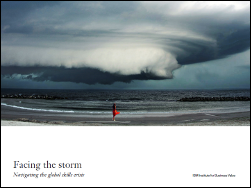Ungated Post | 09 Feb 2018
Navigating the global skills crisis

The IBM Institute for Business Value engaged Oxford Economics to survey more than 5,600 global executives in 18 industries and 48 countries to gauge their current skills challenges and assess future needs.
Our survey respondents confirmed the massive changes occurring across industries worldwide, as well as technology’s influence on consumers. For example, 75% of global business, government, and higher education leaders believe that consumer buying behavior is shifting from a strictly product/service basis to an experience basis. 85% indicate competition is coming from new and unexpected sources, and 67% say that traditional boundaries between industries are blurring as industries are reshaped. As a result, many business leaders believe their structures and processes need to change too.
Oxford Economics’ team is expert at applying advanced economic tools that provide valuable insights into today’s most pressing business, financial, and policy issues.
Related Services

Post
The economic impact of abandoning the WTO
Oxford Economics have been commissioned by the International Chamber of Commerce (ICC) to provide an independent assessment of the economic impact of WTO dissolution. This report details our findings and the assumptions underpinning our analysis.
Find Out More
Post
The economic impact of the sports activities of public service media
This study shows how the sports activities of public service media supported €4.5 billion of GDP and 57,000 jobs across 31 European countries in 2022. The report also highlights wider economic benefits of public service media sports coverage, such as the way in which it leverages sponsorship income for sports bodies.
Find Out More
Post
Global Trade Education: The role of private philanthropy
Global trade can amplify economic development and poverty alleviation. Capable leaders are required to put in place enabling conditions for trade, but currently these skills are underprovided in developing countries. For philanthropists, investing in trade leadership talent through graduate-level scholarships is an opportunity to make meaningful contributions that can multiply and sustain global economic development.
Find Out More